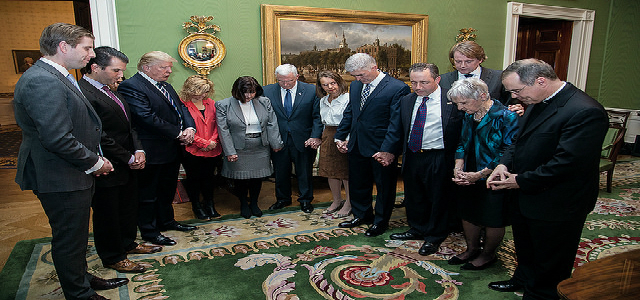White House spokesperson Sarah Huckabee Sanders has suggested that God wants President Donald Trump in the White House.
In an interview with the Christian Broadcasting Network, Ms Sanders stated her personal view that President Trump had divine warrant.
“I think God calls all of us to fill different roles at different times and I think that He wanted Donald Trump to become president,” Ms Sanders said.
“That’s why he’s there and I think he has done a tremendous job in supporting a lot of the things that people of faith really care about,” Ms Sanders said.
EXCLUSIVE! Our @CBNNews interview with WH Press Secretary Sarah Sanders. “I think God calls all of us to fill different roles at different times and I think that he wanted Donald Trump to become president.“ Many video clips coming soon. @JenniferWishon @realDonaldTrump @PressSec pic.twitter.com/paeKtAXIib
— David Brody (@DavidBrodyCBN) January 30, 2019
There are a number of bible verses that would seem on the surface of things to endorse the idea that God installs leaders. One of the more famous passages is Romans 13 1-7.
Former United States Attorney General Jeff Sessions previously used the passage to defend the Trump administration, against criticisms of its immigration policy.
The Apostle Paul writes:
Let every person be subject to the governing authorities; for there is no authority except from God, and those authorities that exist have been instituted by God. 2 Therefore whoever resists authority resists what God has appointed, and those who resist will incur judgment. 3 For rulers are not a terror to good conduct, but to bad. Do you wish to have no fear of the authority? Then do what is good, and you will receive its approval; 4 for it is God’s servant for your good. But if you do what is wrong, you should be afraid, for the authority[a] does not bear the sword in vain! It is the servant of God to execute wrath on the wrongdoer. 5 Therefore one must be subject, not only because of wrath but also because of conscience. 6 For the same reason you also pay taxes, for the authorities are God’s servants, busy with this very thing. 7 Pay to all what is due them—taxes to whom taxes are due, revenue to whom revenue is due, respect to whom respect is due, honor to whom honor is due.
In a paper entitled ‘Romans 13 and Civil Disobedience’, Matthew Anslow, suggests however that things are a more complicated than a surface reading of Romans 13 might suggest. Paul, he writes, wrote the letter to the Roman Christians while under an imperial dictatorship, a form of government few Christians would endorse. Furthermore, Dr Anslow writes that Paul does not give governments carte blanche.
“Read apart from its surrounding context Romans 13:1–7 certainly seems to express unmitigated support for the authorities,” he writes.
“Read in [its] context, however, Paul’s comments take on a different flavour.”
Dr Anslow goes on to suggest that, while Paul forbids resistance against ruling authorities, the original Greek text refers only to violent resistance.
Paul’s use of antitassomai and anthistēmi, words that denote organised and/or violent opposition, suggests a reference not to resistance generally, but rather to violent resistance—to revolt,” he writes.
“Paul’s teaching here is to refrain from violent resistance against the authorities. For Paul, both unquestioning obedience and violent revolt are improper responses to the authorities. On the one hand the authorities must not be obeyed when they are not acting as God’s servants; on the other hand violent revolt does not fall into the category of overcoming evil with love.”
Previous presidents have stated that they believed God wanted them in the White House.
In Australia, it is rarer for politicians and their staff to suggest divine support.
According to Macquarie University ARC Future Fellow Marion Maddox, public representatives in Australia often feel the need to downplay their faith convictions. In her book God Under Howard Dr Maddox suggests that this is because Australian voters are more suspicious of overtly religious candidates.
Jonathan Foye is Insights’ Editor












